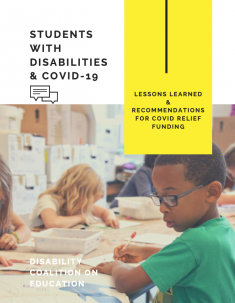
Tennessee’s education system is expected to receive $3.3 billion from the American Rescue Plan, the most recent federal COVID-19 relief package. Outside of specific set-asides for learning loss and other activities, school districts have broad flexibility in how they spend the funds. Governor Lee and the Tennessee Department of Education will have an important role in allocating funding and providing oversight to ensure that COVID relief funding includes and will directly address the learning loss of students with disabilities.
The Disability Coalition on Education, a gathering of organizations and individuals working to improve access to education and school success for students with disabilities, delivered a letter this week to Governor Lee with specific recommendations on how to best allocate those funds for students with disabilities.
In addition, we summarized what we have learned in the past year of advocacy during the pandemic alongside students, families, schools and the Department of Education.
Read the full .pdf here
Read the text version here
Key Takeaways - Considerations for COVID Relief Funding to Benefit Students with Disabilities:
- Implementation of school safety protocol
- Programs to identify and support mental health of students and school staff
- Training for school personnel on managing student behaviors and additional personnel to support these efforts. Providing districts with experts who can provide hands-on assistance on complex cases would make a big difference.
- Training for families to manage behaviors at home and training for students to manage their emotions.
- Student decision-making in choosing service providers. Some school systems used previous CARES Act funding to contract with private therapists in order to fulfill student IEPs when the student is learning virtually. This was very effective for student progress.
- Technology to help students participate in the classroom and with their peers in more inclusive ways, whether learning virtually or in-person.
- New school personnel to support evaluations, changes, implementing and monitoring IEPs across the state.
- An assessment, perhaps by putting together an advisory team to review and determine how we could better use CLP plans or respond to a future pandemic.
- Schools in the provision of compensatory education to students who didn’t receive FAPE or their related services during the pandemic.
- An assessment process for student progress during the pandemic that takes into consideration academic, social and emotional capacities.
- Social and emotional learning programs for all children, especially as students heal from the trauma caused by the pandemic.
- New personnel so that there are dedicated staff in every county to focus on reaching families.
- Personnel and a curriculum to train school staff, students and families to use technology effectively in and out of the classroom.
- An assessment of the effectiveness of alternative schooling models, teacher, student and family experiences and challenges.
- School infrastructure to document and report data relative to positive cases and implementation of safety protocol.
- Hiring new school personnel including qualified staff to provide related services to students regardless of their learning environment.
- A continuum of services available for families that they can choose from at their comfort level. This includes school counseling for the whole family with how to deal with behavior issues. This also includes peer support and respite.
- Hazard pay for teachers providing in-person teaching during a pandemic.
- New protocols for evaluating and reporting student wellbeing and safety in the home. New personnel for intervention and supports.
- Inclusive job training through schools.
- Accessing the expertise in the disability community to support student, family and school planning, communication and success.